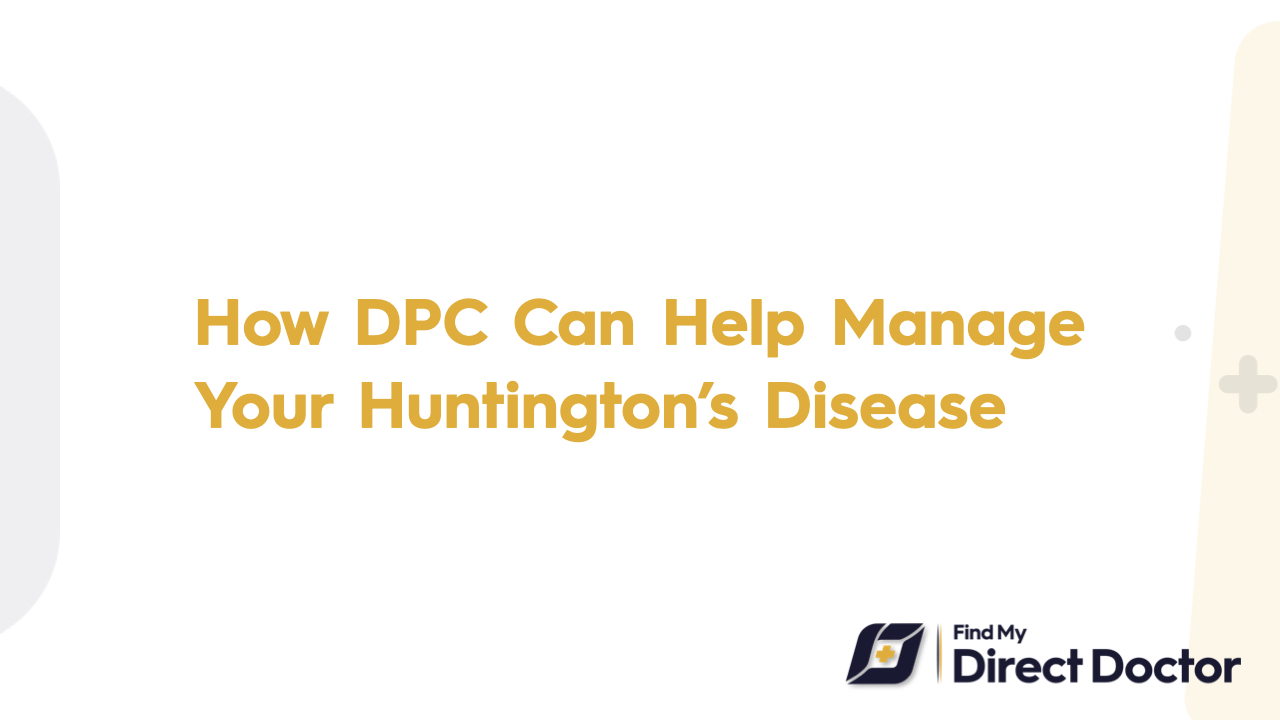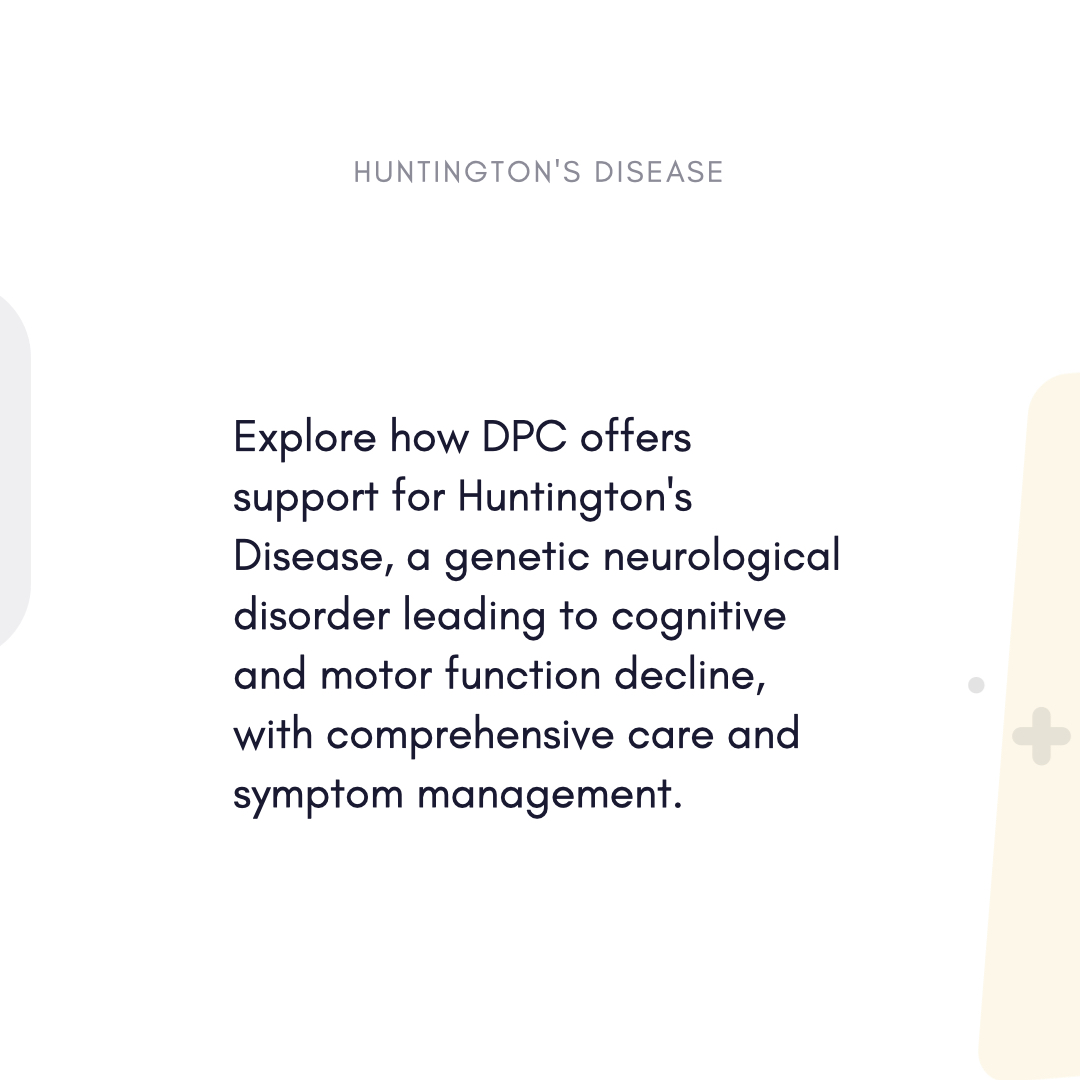Huntington’s Disease and Direct Primary Care (DPC): Your Path to Compassionate, Coordinated Care
A diagnosis of Huntington's disease (HD)—a rare, hereditary neurodegenerative disease—can feel terrible. HD demands lifetime, multidisciplinary treatment and is typified by increasing motor decline, cognitive impairment, and psychiatric symptoms. Many times struggling to handle its complexity, traditional healthcare leaves families overwhelmed. Affordable, individualized treatment that stresses symptom management, emotional support, and dignity provides a lifeline: Direct Primary Care (DPC). Let's look at how DPC helps HD patients and families negotiate this difficult path.

Comprehending Huntington's Disease
A genetic mutation in the HTT gene causes HD, which breaks down brain nerve cells. Usually developing between ages 30 and 50, symptoms worsen over 10 to 25 years. Important obstacles consist in:
- Chorea—involuntary motions—along with rigidity and trouble swallowing define motor symptoms.
- Cognitive decline: trouble focusing, poor judgment, memory loss.
- Psychiatric problems included psychosis, anxiety, irritability, and depression.
- Burnout among caregivers: Families sometimes pay the emotional and physical toll of round-the-clock care.
Early intervention can slow down progression and enhance quality of life even though there is no cure.
DPC Transforms HD Treatment
Under the membership approach known as Direct Primary Care (DPC), patients pay a monthly fee—usually USD 50–USD 150—for unlimited access to their doctor. This means for HD families no hurried visits, no surprise bills, and a care team committed to your emotional and physical needs.
Customized, Ongoing Attention to Detail
Using recommendations from the Huntington's Disease Society of America (HDSA), DPC physicians provide:
- Prescription writing for drugs like tetrabenazine for chorea, antidepressants, or antipsychotics.
- Working with neurologists, physical therapists, and speech-language pathologists, you can build consistent treatment plans.
- Using therapy or support groups, address depression, anxiety, or caregiver stress.
- Encouragement of conversations about end-of-life preferences and palliative care helps advance care planning.
Cost-Effective, Transparent Treatment
Wholesale-priced drugs help DPC clinics lower financial burden by:
- Discounted generics for symptom control—such as amantadine, SSRIs.
- Discounted labs include metabolic panels at cost and genetic testing—such as HTT mutation confirmation.
- Preventive emphasis: Staying away from expensive hospitalizations by means of aggressive infection control or fall prevention.
Holistic, Multidisciplinary Assistance
DPC combines every facet of HD treatment:
- Pharmacologic treatments: Customizing regimens for psychological and motor symptoms.
- Supportive therapies include coordination of speech, occupational, and physical therapies.
- Specialized cooperation: Guaranteeing flawless contact with hospice teams, psychologists, and neurologists.
Personalized DPC HD Management
The fluctuations of HD call for specific plans. DPC provides exact care:
- Genetic counseling guides at-risk family members through choices about tests.
- Holistic approach: Adaptive tools to keep independence, mindfulness, or music therapy.
- Regular screenings for metabolic changes, aspiration hazards, or dysphagia help with surveillance.
Real-Life Success Stories
- Case 1: 48-year-old Michael developed increasing chorea and depression. His DPC doctor wrote a prescription for tetrabenazine, linked him with a movement disorder specialist, and set up in-home physical therapy. Michael's mobility improved, and his wife started a neighborhood HD caregiver support group.
- Case 2: Anxiety over her genetic risk plagued 52 pre-symptomatic HTT carrier Linda. Her DPC doctor advised her, teamed with a geneticist, and helped her design a wellness plan stressing brain function. Linda helps HD advocacy groups now.
Frequently Asked Questions: DPC and Huntington's Disease
- Q: Can DPC handle advanced HD?
A: It is indeed. While upholding dignity and comfort, DPC doctors coordinate home health, palliative care, and hospice services.
- Q: Is DPC within budget for long-term HD treatment?
A: Absolutely. Most families save on ER trips, specialist co-pays, and drugs. Usually, memberships run less than a monthly utility bill.
- Q: What should I do if I need a neurologist?
A: Your DPC doctor guarantees flawless communication with HD experts and controls referrals.
Why DPC Wins for Huntington's Disease Patients
DPC aligns with HDSA rules to directly address her issues:
- Improved accessibility: Same-day visits for agitation or aspiration pneumonia, a serious condition.
- Continuity of care: A reliable professional knowing HD's development and your family's particular requirements.
- Customized schemes: Deeper attention to symptom evolution, preferences, and caregiver needs is made possible by smaller patient panels.
- Lowered administrative load: Without insurance documentation, more time for patient care—which is absolutely vital for complicated HD management.
Take Charge of Your HD Journey Today
Though relentless, Huntington's disease is not something you have to face on your own. Using DPC helps you find a partner who combines medical knowledge with relentless compassion to help you negotiate every stage with dignity and preserve quality of life.






